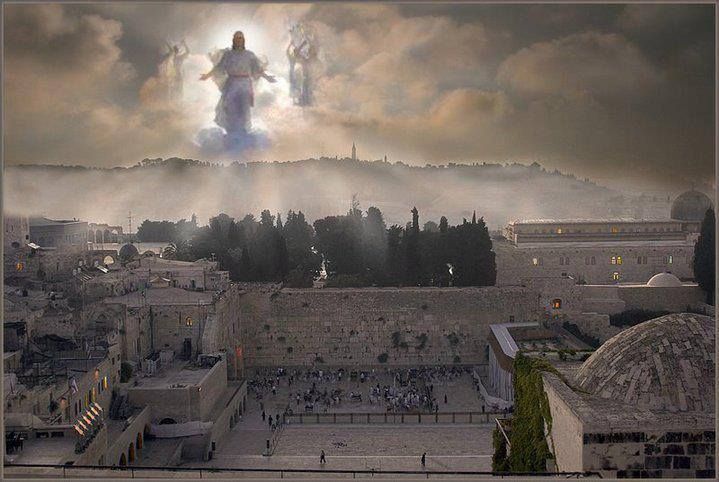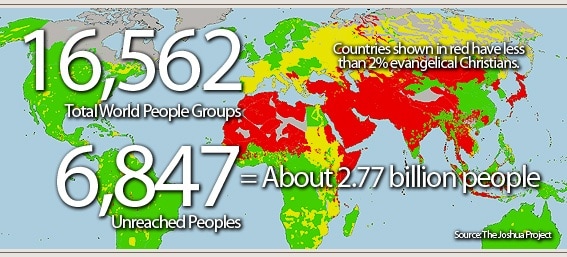
Although Jesus told his followers they couldn’t figure out the exact day or hour, that hasn’t stopped the search for clues about the general timeframe. In the last hundred years, people have latched on to Jesus’ prediction of “the end” in Matthew 24:14, “This gospel of the kingdom shall be preached in the whole world as a testimony to all the nations, and then the end will come.”
Do Jesus' words mean systematically sharing the gospel around the globe can speed up "the end"?
When the context of this statement is disregarded or misunderstood, Christians assume Jesus’ words explain why we are still waiting for him to return and set up his kingdom on earth. Theologian George Eldon Ladd summarized how a growing number of Christians interpret Jesus’ explanation in his 1959 book The Gospel of the Kingdom and The Gospel Coalition (whose council members include John Piper, D.A. Carson, Tim Keller and Al Mohler) promote his logic to this day:
When will the Kingdom come? I am not setting any dates. I do not know when the end will come. And yet I do know this: When the Church has finished its task of evangelizing the world, Christ will come again. The Word of God says it.
Why did He not come in A.D. 100? Because the Church had not evangelized the world.
Why did He not return in A.D. 1000? Because the Church had not finished its task of world-wide evangelization.
Is He coming soon? He is—if we, God’s people, are obedient to the command of the Lord to take the Gospel into all the world.
But what if we have misunderstood the message of Matthew 24:14 and pinned our hopes on a false promise? We must dissect the language and context of Jesus’ statement to determine what he meant and to clearly identify what exactly would end once the nations heard about the kingdom’s arrival.
When Jesus says, “This gospel of the kingdom shall be preached in the whole world as a testimony to all the nations, and then the end will come,” our first question should be: the end of what will come?
To answer that question we have to go back to the beginning of Jesus' discourse in Matthew 24 where he first uses the expression “the end.” We must define his terms by the preceding context.
In Matthew 24:1-3, the context for Jesus’ entire teaching in the chapter is established.
1 Jesus came out from the temple and was going away when His disciples came up to point out the temple buildings to Him. 2 And He said to them, “Do you not see all these things? Truly I say to you, not one stone here will be left upon another, which will not be torn down.” 3 As He was sitting on the Mount of Olives, the disciples came to Him privately, saying, “Tell us, when will these things happen, and what will be the sign of Your coming and of the end of the age?”
Although the language of God’s “coming” and “the end of the age” sound like a cataclysmic end to the world, it was actually normal language about historical events. Prophets used those expressions to describe major military conflicts in Israel's history that radically changed life for God’s people. Jeremiah did it. Ezekiel did it. And now Jesus is describing the struggle, death, and destruction brought by an outside force attacking Jerusalem with such language.
The disciples use the language of “your coming” to clarify that the events are divinely orchestrated activity. The coming of an empire to attack Jerusalem will be something God planned to further his purposes, not just some random act of international warfare. Isaiah used the same language to describe how God orchestrated Egypt’s political struggles: “the Lord rides on a swift cloud and is coming to Egypt. The idols of Egypt tremble before him” (Isaiah 19:1). The language of God’s “coming” didn’t mean he showed up in person on condensed vapors; it meant God orchestrated Egypt’s discipline for idol worship through historical conflicts.
When the disciples describe the destruction of the Temple in Matthew 24:14 as “the end of the age,” the language is not new in the Gospel. The phrase “end of the age” occurs in Matthew five times (Matthew 13:39, 40, 49; 24:3; 28:20). Since no other Gospel uses the same language, we have to define the expression by its context in Matthew’s Gospel.
In Matthew’s theology, “the end of the age” refers to the end of a time period that witnesses the growth of the kingdom. The Parable of the Wheat and Tares and the Parable of the Dragnet in Matthew 13 use the expression three times to describe how the missionary work of Jesus and his followers will rapidly expand the size of the kingdom before a climactic act of discipline from God. The specific act of discipline and its timing remain unclear in those Parables.
In the context of Matthew 24:1-3, the “end of the age” happens simultaneously with the destruction of Temple buildings. Putting those ideas together would mean that Jesus and his disciples are going to spread the Gospel throughout Israel and the known world before foreign invaders conquer Jerusalem and crush the Temple. The language of the “end of the age” emphasizes how the Temple’s destruction is a profoundly significant shift in what God has been doing on earth that we better not overlook.
So what “age” ends when the Temple that Jesus and his disciples were looking at gets torn down? According to the Old Testament, it is the age that started when the first temple was built. Before the Temple was a permanent building in Jerusalem, it was a tent, often called the
Tabernacle, that was built according to the instructions given in Exodus 25-40. The Tabernacle and Temple’s structure, with its altar and ark of the covenant and holy place, made it possible for people to come and pray and worship God with the help of priests. It enabled God’s people to worship according to the instructions given in Israel’s first covenant with God. Its destruction would mean the “end” of that first covenant, creating the need for a new covenant to replace it.
Since Jesus announced a new covenant between God and his people that was created by his blood and body (rather than the blood and sacrificed body of bulls in the first covenant ceremony in Exodus 24:1-7), Jesus' prediction of “the end of the age” points to the monumental shift in history from the Old Covenant to the New Covenant. Jesus announced the inauguration of a New Covenant at a Passover meal with his disciples (see Matthew 26:26-29) just a few days after he spoke about “the end” of the Old Covenant age in Matthew 24. All those events and announcements must be linked to understand what Jesus’ words mean.
The context of Matthew 13, 24, and 26 makes the definition of Jesus’ words in Matthew 24:14 clear. He is predicting the Temple’s destruction, which will mark the end of his old agreement with Israel. It will make sacrificing animals and seeking God’s presence at a Temple in Jerusalem impossible. Instead, his new arrangement with his followers, the church, will become the universal framework for connecting with God. The proclamation of the Gospel throughout the world from the time of Jesus’ ministry to the time of the Temple’s destruction was going to build a new community that God directly inhabited. The church would become God’s living Temple where he manifested his presence in the world. It marked a radically new era in human history.

The reason why interpreters have assumed Jesus’ prediction of “the end” referred to a future destruction of planet earth rather than the end of the Old Covenant age is found in the first clause of Matthew 24:14, “This gospel of the kingdom shall be preached in the whole world as a testimony to all the nations, and then the end will come.” Based on our contemporary knowledge of “the whole world,” it doesn’t seem realistic to believe that “all the nations” heard the “gospel of the kingdom” before the Romans destroyed the Jerusalem Temple in 70AD. So Jesus’ prediction must be talking about the end of the world after every nation is evangelized. Right?
That line of logic used to convince me before I fact-checked my assumptions with careful historical and literary research. I had heard Christian teachers define a “nation” (the Greek word “ethnos”) as a distinct ethnic group with its own language and distinct geographic habitation. I had read the lists of thousands of people groups with no known church. And so I had assumed the “testimony to all the nations” had not yet occurred.
However, people in the ancient Roman Empire did not use the word “nation” with a precise scientific definition of distinct ethno-linguistic groups on every continent. They didn’t even know all the continents that existed on the globe! So no first-century interpreter of Jesus’ words would have calculated an exhaustive list of ethnic groups inside every geo-political boundary. That's not how the expression functioned in the pre-modern language of the New Testament.
How do I know? Acts 2:5 claims that Jews “from every nation under heaven” gathered in Jerusalem and heard the disciples proclaim the Gospel in their native languages. That's quite a universal claim if we read it with our globalized perspective. Jews from every nation under heaven heard the Gospel! If we read that claim without regard for the historical context, we would think Jews had come from China or from the Aztec nation or from the aboriginal peoples of what would become Australia. But such transportation wasn’t possible in the first century, and no Jews lived among all the distinct ethno-linguistic tribes on planet earth at the time.
Claiming that Jews “from every nation under heaven” gathered in Jerusalem is simply a figure of speech. It meant that Jews had come from all over the known world. Idiomatically, it would be better translated as “Jews had come from all over the place.” The phrase is phenomenological, meaning it represents what people could observe from their limited experience in the world. It didn’t have the universal and mathematically precise definition that we mistakenly read into it.
Matthew 24:14 had the same limited geography in mind as Acts 2:5. In fact, the Greek word, oikoumene, translated “the whole world” in Matthew 24:14 was used by many ancient writers to describe the empires of their day (e.g., Josephus used oikoumene to describe the Persian Empire under Cyrus in Antiquities of the Jews 11.3). So Jesus was predicting that the disciples would first preach the Gospel to people from all over the Roman Empire before the Temple's destruction. What the disciples started at Pentecost with Jews from all around the Roman Empire and preached throughout the known inhabited world afterwards fulfilled Jesus' prediction of the Gospel going into “the whole world” in Matthew 24:14. It didn’t mean the Gospel had been proclaimed to the Mayan civilization, native Americans, and Eskimos. It simply meant “people from all over the place” had heard. Any more precise and globalized reading would be placing modern expectations on ancient expressions which carried no such meaning.
The known world back then wasn’t mapped with all the continents and people groups we know today. Jesus came from a corporate culture not an individualistic mindset. If people from lots of different places had heard at Pentecost or through the ongoing preaching of Paul and the other apostles, then the whole known world in and around the Roman Empire had heard the Gospel in the first century. We need to adopt this biblical perspective rather than read modern assumptions back into the text.
The common error of forcing modern scientific precision upon phenomenological statements in Scripture leads to arbitrary calculations of “nations.” The good work of sharing the Gospel becomes a misconstrued math game to hasten the return of Jesus.
To play that game, people have to make up meaning to the language in Scripture that the authors never intended for readers to find there. Specifically, the concept of a “nation” has to be defined before you can decide if the Gospel has been preached there. But that is harder than it first sounds. Is a nation defined by genetics (your "ethnicity"), language, geography, size, or all of the above: a distinct ethno-linguistic geo-political people group?
If you can pick a preferred definition for “nation,” which ends up with more modern precision than the Greek word ethnosever intended in the New Testament, next you must decide what it means for a nation to “hear” the Gospel. It forces an arbitrary distinction between a “Reached” and “Unreached” people group. To be "reached," does only one person need to hear the Gospel, does one church need to be established, or does 2% of the population need to become Christian?
Since the answers to these questions are arbitrarily produced by each person’s opinion rather than by Jesus’ intended meaning, the calculations of unreached people groups vary. Mission Possible 2013 concluded, “Today there are 476 Un-engaged, Unreached People Groups with populations more than 40,000 who are still beyond the reach of the gospel of Jesus Christ.” In a briefing paper for CapeTown 2010, Paul Eshleman reported, “2,365 people groups with over 5,000 population still have no missionary.” Southern Baptists believe 3,244 people groups remain unreached and unengaged, meaning about 280 million people are in distinct ethno-linguistic groups where less than 2% of the population is Christian and no consistent church-planting strategy exists.[2] No one agrees on the actual number of groups because the definition of “unreached, unengaged people groups” is arbitrarily assigned.
When ministries try to prioritize distinct ethnic groups that don’t have at least 2% of their population converted already, they end up walking by cities in India with 8 million non-believers to reach a small village of 17,000 people. The end result in certain regions of the world is fewer people hearing the Gospel, the exact opposite outcome than what Jesus wanted! And it’s all because they focus on arbitrary lists of unengaged, unreached people groups.
So what is the right number of unreached, unengaged people groups? That's an impossible question to answer. And it is the wrong question to even ask. Jesus' claim that “This gospel of the kingdom shall be preached in the whole world as a testimony to all the nations, and then the end will come” is a general prediction of what happened between Pentecost and the destruction of the Jerusalem Temple in 70AD. The Gospels record Jesus' prediction, and Acts records how the Gospel was then preached throughout the known world. Counting unreached people groups is missing the meaning of Jesus's words in Matthew 24:14.
Finishing the task of world evangelization so Jesus can return is not a biblical paradigm. Paul and the other Apostles had taken the gospel of Jesus’ kingdom throughout the known world, defined as the inhabited Roman Empire by Jesus in Matthew 24:14 using the Greek word oikumene. The destruction of the Temple in Jerusalem confirmed their announcement of the great transition of the ages from the Old Covenant, centered on the Temple, to the New Covenant, led by a heavenly king.
It may be hard for our modern minds to avoid imposing mathematical precision on the meaning of Jesus' words. Yet, we must respect what he meant. We are not on a mission to get the end to come. We can’t share the Gospel enough in order to make Jesus come back. We are completely missing the point if we create a list of people groups and start checking them off until Jesus comes. Crossing off arbitrarily defined, unreached peoples from a list is a self-deluded misadventure in trying to control the future.
Our mission is to continue announcing the new kingdom Jesus started, long after the Old Covenant age has come to an end with the destruction of the Temple. Jesus wasn’t focused on just getting to the end of that age, but on building momentum that would last for centuries as a new international body of believers grew everywhere Jesus’ disciples would go. A grammatical analysis of the Great Commission will demonstrate that Jesus’ emphasis was on methodical kingdom-building, not mathematically measured nation-reaching.
When Jesus said in Matthew 28:18, “Go and make disciples of all nations,” the command was not to go to every distinct ethno-linguistic group that we can map out with some subjective set of guidelines. The word “go” is actually a participle. The command is to “make disciples.” It would be better translated, “As you are going, make disciples.” Our job is to make disciples everywhere we go, not to obsess about where we go next.
So let's stop missing the point and make sure more individuals get to hear the significance of the kingdom Jesus started in the first century. Matthew 24:14 predicted a monumental change of the ages after the message of King Jesus had spread through the Roman Empire. And we now live in the New Covenant age where God’s presence is available to all if we pronounce the good news everywhere we go.
Jesus promised his first-century disciples to be present with them until “the end of age” (Matthew 28:20), and he promises to be with us now that the Old Covenant age has ended. As he said, “Where two or three are gathered in my name, I am there among them” (Matthew 18:20). We don’t have to mistakenly manipulate Jesus to return to the earth because he is already here!
I hope hearing what Jesus’ words meant frees you from false promises you found in Matthew 24:14 and from misguided strategies to get Jesus back here sooner. Instead, I hope the anxiety of his perceived absence is replaced by the calming confidence of his nearness. That unfailing presence is a gift we can receive and give to every person struggling in an often isolated world.








 RSS Feed
RSS Feed
